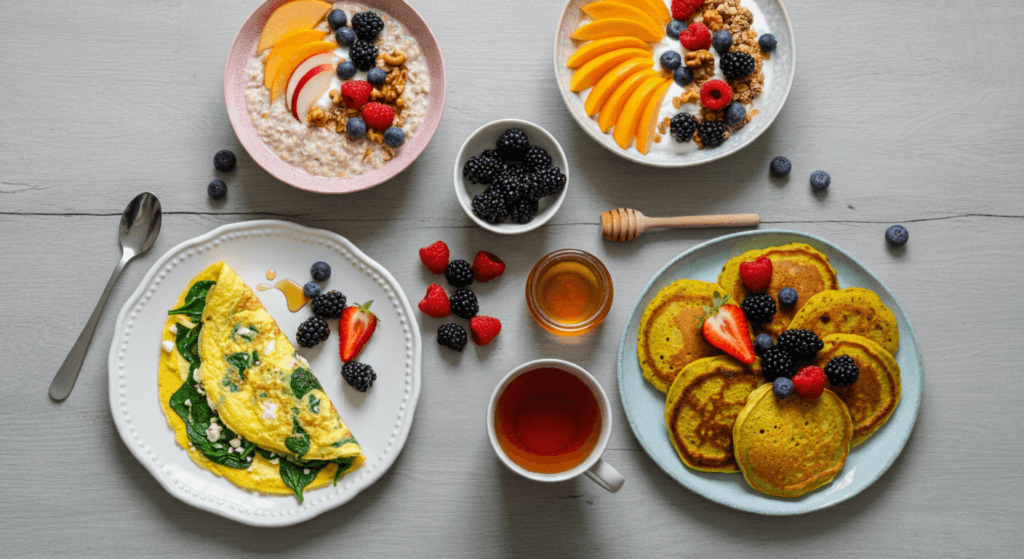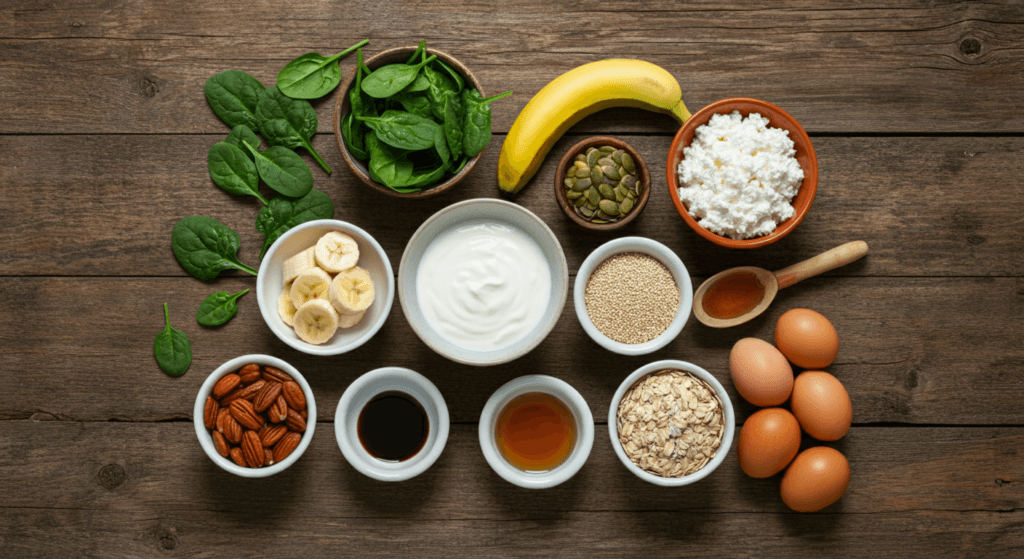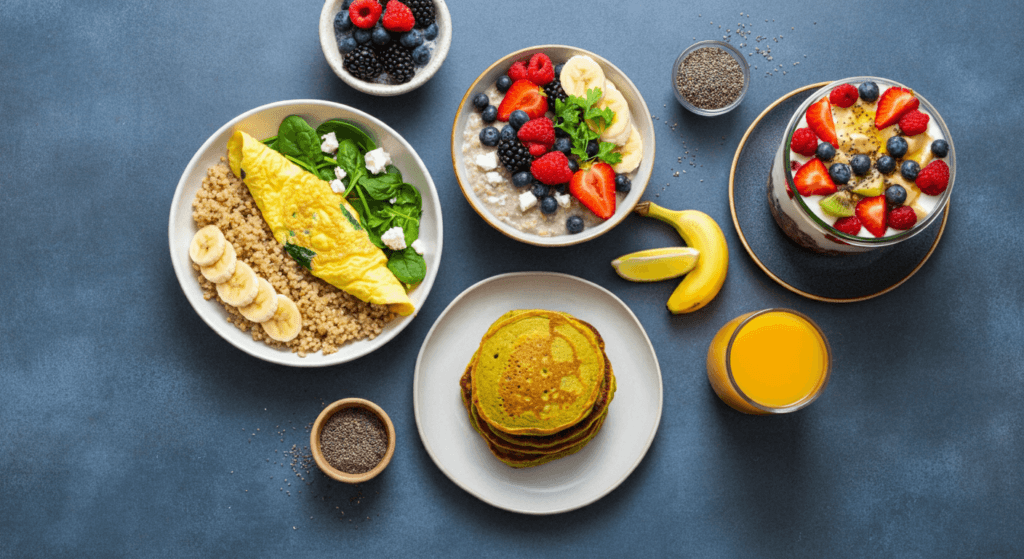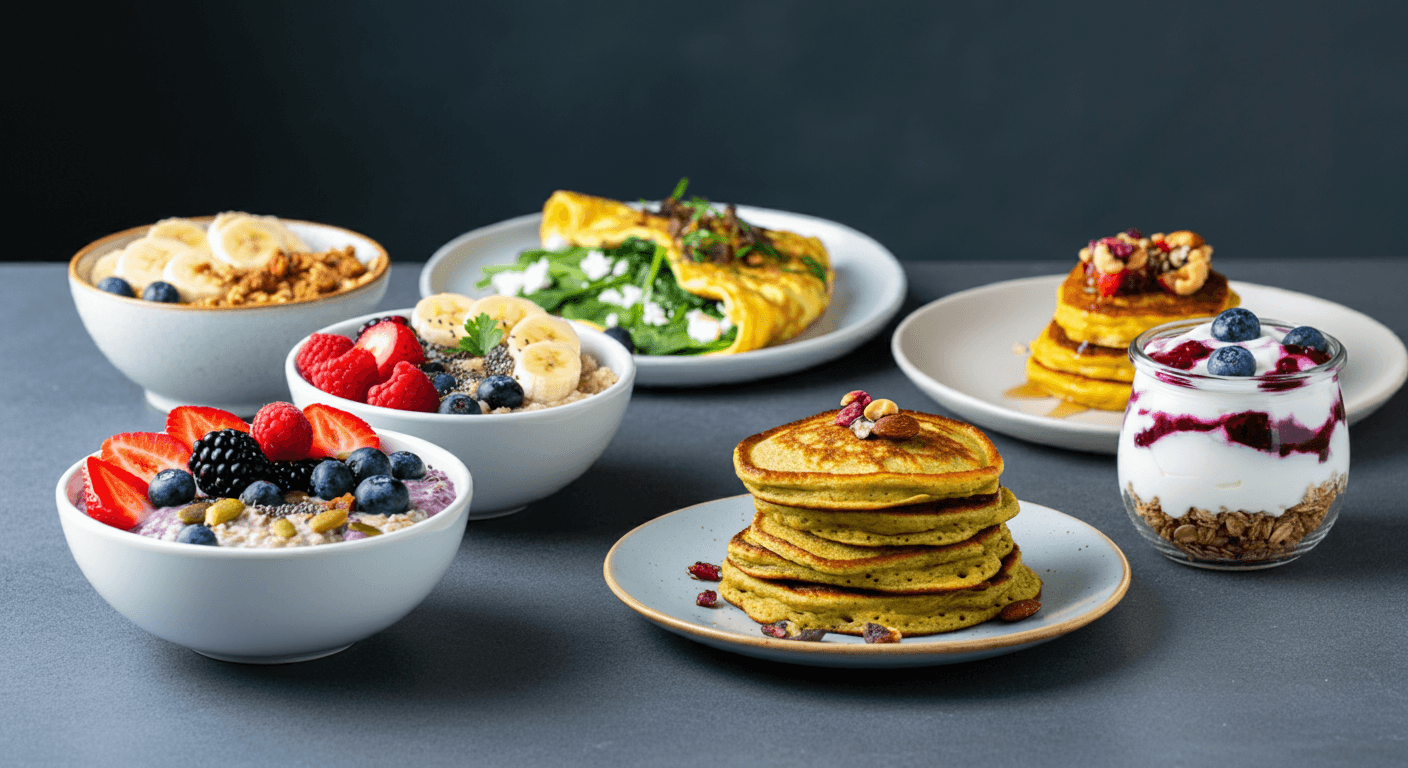The Ultimate Guide to High Protein Vegetarian Breakfasts: Fuel Your Mornings!
In recent years, the focus on healthy eating has surged, with more individuals becoming aware of the impact of their dietary choices on overall health. Among the many meals that we consume daily, breakfast holds a special place. It sets the tone for the day, fuels our bodies after a night of fasting, and provides essential nutrients to kickstart our metabolism. For vegetarians, finding a breakfast rich in protein can be a challenge, but it is crucial for maintaining energy levels, supporting muscle health, and promoting satiety throughout the day.
This comprehensive guide will explore the significance of high protein vegetarian breakfasts, provide delicious recipes, and offer practical tips for incorporating these meals into your daily routine. Whether you are a long-time vegetarian or just looking to reduce your meat consumption, this guide will equip you with the knowledge and tools to create satisfying and nutritious breakfasts that will keep you energized and focused.

Why Protein Matters
1. Understanding Protein
Proteins are macronutrients composed of amino acids, which are the building blocks of our body. They play a vital role in numerous bodily functions, including:
- Tissue Repair and Growth: Proteins are essential for repairing tissues and promoting growth, making them crucial for recovery after exercise and injury.
- Hormone Production: Many hormones are proteins or peptides, which regulate various physiological processes in the body, including metabolism and mood.
- Immune Function: Antibodies, which help defend against infections, are made of proteins.
- Enzyme Activity: Enzymes, which facilitate biochemical reactions, are also proteins.
2. The Role of Protein in Weight Management
High protein diets have been shown to aid in weight management by promoting satiety. Consuming protein-rich foods can help you feel fuller for longer, reducing the likelihood of unhealthy snacking later in the day. Additionally, protein has a higher thermic effect compared to carbohydrates and fats, meaning your body burns more calories digesting protein than it does with other macronutrients.
3. Protein and Energy Levels
Kicking off your day with a protein-rich breakfast can promote stable blood sugar levels, ensuring a consistent flow of energy during the morning hours. Unlike sugary breakfasts that can lead to spikes and crashes in energy, a protein-rich meal can keep you feeling energized and focused.
4. Recommended Daily Protein Intake
The recommended daily intake of protein differs according to factors such as age, gender, and activity level. Typically, adults should strive for approximately 0.8 grams of protein for every kilogram of body weight.
High Protein Vegetarian Ingredients

To create a high protein vegetarian breakfast, it’s essential to know which ingredients are rich in protein. Here’s a list of some of the best vegetarian protein sources:
1. Legumes
Legumes serve as a fantastic source of both protein and dietary fiber. They include:
- Lentils: Approximately 18 grams of protein per cooked cup.
- Chickpeas: About 15 grams of protein per cooked cup.
- Black Beans: Roughly 15 grams of protein per cooked cup.
2. Dairy Products
Dairy products are rich in protein and calcium. Some options include:
- Greek Yogurt: Greek yogurt offers roughly 10 grams of protein for every 100 grams.
- Cottage Cheese: Cottage cheese provides approximately 28 grams of protein in a single cup.
- Milk: Milk delivers around 8 grams of protein in each cup.
3. Eggs
Eggs represent a complete source of protein, containing all essential amino acids. A single large egg contains about 6 grams of protein. For those following a vegetarian diet, eggs can be a staple ingredient for breakfast.
4. Nuts and Seeds
Nuts and seeds are not only high in protein but also healthy fats. Some examples include:
- Almonds: About 6 grams of protein per ounce (about 23 almonds).
- Chia Seeds: Approximately 5 grams of protein per ounce.
- Pumpkin Seeds: Roughly 7 grams of protein per ounce.
5. Whole Grains
Whole grains provide protein along with fiber and other essential nutrients. Some options include:
- Quinoa: Quinoa provides roughly 8 grams of protein in each cooked cup.
- Oats: Oats offer around 6 grams of protein per cooked cup.
- Whole Wheat Bread: Whole wheat bread contains approximately 4 grams of protein per slice.
6. Plant-Based Protein Powders
For those who need an extra protein boost, plant-based protein powders made from peas, hemp, or brown rice can be an excellent addition to smoothies and other breakfast recipes.
Delicious High Protein Vegetarian Breakfast Recipes
Now that we understand the importance of protein and the best sources, let’s dive into some delicious high protein vegetarian breakfast recipes that you can easily prepare at home.
1. Protein-Packed Overnight Oats
Ingredients:
- 1/2 cup rolled oats
- 1 cup almond milk (or any plant-based milk)
- 1 tablespoon chia seeds
- 1/2 cup Greek yogurt (or plant-based yogurt)
- 1 tablespoon almond butter (or peanut butter)
- 1 tablespoon honey or maple syrup (optional)
- Fresh fruits (e.g., berries, banana) for topping
Instructions:
- In a mason jar or bowl, combine the rolled oats, almond milk, chia seeds, and Greek yogurt. Stir well to combine.
- Add the almond butter and sweetener (if using) and mix until smooth.
- Seal the container and place it in the refrigerator overnight (or for a minimum of 4 hours).
- In the morning, stir the mixture and top with fresh fruits before serving.
Nutritional Information (per serving):
- Calories: 450
- Protein: 25g
- Carbohydrates: 55g
- Fats: 15g
2. Spinach and Feta Omelet
Ingredients:
- 3 egg whites (or 2 whole eggs)
- 1/2 cup fresh spinach, chopped
- 1/4 cup feta cheese, crumbled
- Salt and pepper to taste
- Olive oil for cooking
Instructions:
- In a mixing bowl, beat the egg whites and season with salt and pepper.
- Warm a non-stick skillet over medium heat and drizzle in some olive oil.
- Add the chopped spinach and sauté until wilted.
- Pour the egg mixture over the spinach and cook until the edges begin to set.
- Add the feta cheese on top and carefully fold the omelet over. Cook for another minute or until fully cooked.
Nutritional Information (per serving):
- Calories: 180
- Protein: 20g
- Carbohydrates: 2g
- Fats: 10g
3. Quinoa Breakfast Bowl
Ingredients:
- 1 cup cooked quinoa
- 1/2 cup almond milk (or any plant-based milk)
- 1 tablespoon maple syrup (optional)
- 1 tablespoon almond butter
- 1/2 banana, sliced
- 1 tablespoon chia seeds
- Fresh berries for topping
Instructions:
- In a saucepan, combine the cooked quinoa and almond milk. Heat over medium until warm.
- Stir in the maple syrup and almond butter until thoroughly blended.
- Transfer to a bowl and top with banana slices, chia seeds, and fresh berries.
Nutritional Information (per serving):
- Calories: 400
- Protein: 12g
- Carbohydrates: 60g
- Fats: 15g
4. Chickpea Flour Pancakes
Ingredients:
- 1 cup chickpea flour (besan)
- 1 cup water
- 1/2 teaspoon turmeric powder
- 1/2 teaspoon cumin powder
- Salt and pepper to taste
- Olive oil for cooking
- Fresh herbs (e.g., cilantro, parsley) for garnish
Instructions:
- In a mixing bowl, combine chickpea flour, water, turmeric, cumin, salt, and pepper. Whisk until smooth.
- Preheat a non-stick skillet over medium heat and pour in a splash of olive oil.
- Ladle some batter onto the skillet and cook until bubbles appear on the surface. Flip it over and cook the other side until it turns golden brown.
- Serve warm, garnished with fresh herbs.
Nutritional Information (per serving):
- Calories: 250
- Protein: 15g
- Carbohydrates: 30g
- Fats: 10g
5. Greek Yogurt Parfait
Ingredients:
- 1 cup Greek yogurt (or plant-based yogurt)
- 1/2 cup granola (preferably low-sugar)
- 1/2 cup mixed berries (strawberries, blueberries, raspberries)
- 1 tablespoon honey (optional)
- 1 tablespoon chia seeds
Instructions:
- In a bowl or glass, place half of the Greek yogurt at the base.
- Add half of the granola and half of the mixed berries.
- Layer the remaining yogurt, granola, and berries on top.
- Drizzle with honey (if using) and sprinkle with chia seeds before serving.
Nutritional Information (per serving):
- Calories: 350
- Protein: 25g
- Carbohydrates: 45g
- Fats: 8g
Tips for Incorporating High Protein Vegetarian Breakfasts

1. Meal Prep
One of the best ways to ensure you have high protein breakfasts ready to go is to meal prep. Set aside some time each week to prepare your breakfasts in advance. For example, you can batch-cook oatmeal, quinoa, or pancakes and store them in the refrigerator or freezer for quick access during busy mornings.
2. Experiment with Flavors
Feel free to explore different flavors and ingredients without hesitation. Adding spices like cinnamon, nutmeg, or vanilla can enhance the taste of your breakfast. Additionally, incorporating different fruits, nuts, and seeds can provide variety and keep your meals exciting.
3. Use Protein Supplements
If you find it challenging to meet your protein needs through whole foods alone, consider incorporating protein supplements into your breakfast. Plant-based protein powders can easily be mixed into smoothies, oatmeal, or yogurt for an extra protein boost.
4. Balance Your Plate
Aim to create balanced breakfasts that include a combination of protein, healthy fats, and carbohydrates. This balance will help keep you satisfied and energized throughout the morning. For example, pair protein-rich foods like Greek yogurt with healthy fats from nuts and carbohydrates from fruits or whole grains.
5. Stay Hydrated
Don’t forget to drink plenty of water throughout the day, including during breakfast. Staying hydrated is essential for overall health and can also help improve digestion and nutrient absorption.
6. Listen to Your Body
Individual nutritional requirements vary, making it important to tune into your body. Observe how various foods affect your well-being and modify your breakfast selections as needed.
Overcoming Common Challenges
1. Lack of Time
For many people, mornings can be hectic, making it challenging to prepare a nutritious breakfast. To overcome this, consider the following strategies:
- Quick Recipes: Choose recipes that can be prepared in under 15 minutes, such as smoothies or overnight oats.
- Batch Cooking: Prepare larger quantities of breakfast items on weekends and store them in individual portions for easy access during the week.
2. Limited Ingredients
If you find yourself short on ingredients, get creative with what you have on hand. Many high protein vegetarian breakfasts can be modified based on available ingredients. For example, if you don’t have Greek yogurt, you can substitute it with cottage cheese or a plant-based alternative.
3. Budget Constraints
Eating healthy doesn’t have to be expensive. Here are some budget-friendly tips:
- Buy in Bulk: Purchase staples like oats, legumes, and nuts in bulk to save money.
- Seasonal Produce: Opt for seasonal fruits and vegetables, which are often cheaper and tastier.
- Plan Meals: Create a meal plan for the week to avoid impulse purchases and food waste.
Nutritional Considerations for Vegetarians
1. Complete vs. Incomplete Proteins
While many plant-based protein sources are incomplete (lacking one or more essential amino acids), combining different protein sources can help you achieve a complete amino acid profile. For example, pairing rice and beans or whole wheat bread with peanut butter can provide all essential amino acids.
2. Micronutrients of Concern
Vegetarians should also pay attention to certain micronutrients that may be lacking in their diets, including:
- Vitamin B12: Found primarily in animal products, vegetarians should consider fortified foods or supplements.
- Iron: Plant-based sources of iron (such as legumes, tofu, and leafy greens) are less bioavailable than animal sources. Pairing iron-rich foods with vitamin C-rich foods (like citrus fruits) can enhance absorption.
- Omega-3 Fatty Acids: Consider incorporating flaxseeds, chia seeds, or walnuts into your diet for plant-based omega-3s.
3. Regular Health Check-Ups
Routine consultations with a healthcare professional can help confirm that you are fulfilling your nutritional requirements. Blood tests can help identify any deficiencies and guide dietary adjustments.
Conclusion
A high protein vegetarian breakfast is not only delicious but also crucial for maintaining energy levels, supporting muscle health, and promoting overall well-being. By incorporating a variety of protein-rich ingredients and experimenting with different recipes, you can create satisfying and nutritious breakfasts that set a positive tone for your day.
Remember that everyone’s nutritional needs are unique, so listen to your body and adjust your meals accordingly. Whether you are a seasoned vegetarian or just starting to explore plant-based eating, this guide serves as a resource to help you fuel your mornings and embrace a healthier lifestyle.

